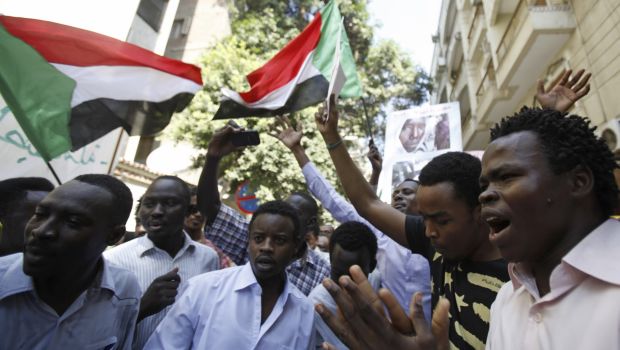In this day and age, no regime can be stable unless it meets four conditions: its legitimacy is accepted by a critical section of the people, it ensures security, it provides suitable means of living, and it receives international approval.
The Sudanese regime has raised an Islamic banner, which is rendered meaningless because its opponents are a broadly Islamist opposition, and the political forces with no Islamic reference were already against the regime.
The regime pushed the country deep into civil war under the banner of jihad, and earned wide sympathy for its enemies both internally and internationally.
Former vice president Dr. John Garang told me that “the leaders of the [salvation] coup deserve commemorative statues in Juba.” The regime’s actions resulted in a consensus in favor of secession among the people of South Sudan, and its failure to implement the South Kordofan and South Blue Nile protocols resulted in a civil war in those areas.
Some youth are members of political parties, but the majority are not. The youth are the most disaffected group in Sudan and the angriest at the regime, because most of them are unemployed. They have expressed their feelings by joining armed factions. Many also aspire to leave Sudan; many have joined protest movements, allied themselves to jihadists, begun to use drugs, and so on.
The regime has alienated large sections of society through its leaders’ openly corrupt practices. These formed the critical bloc that rejected the regime and deprived it of legitimacy.
The regime has failed to provide a living for its people. Around 20 percent of them have emigrated from the country, and similar number live on humanitarian and international aid. The rest are suffering from unemployment and from the relentlessly rising cost of living. Even employed people find their wages aren’t enough to cover their needs.
Sudan’s capitalist sector is burdened by heavy taxes and competition from government-backed companies. All the regime’s economic slogans have failed. The country imported USD 72 million in food when the “we eat what we grow” slogan was launched. Today, it is USD 1 billion. There is a similar situation with the slogan “we wear what we make.”
The regime does not provide a reasonable standard of living to the people of Sudan. People talk about those slogans and laugh at what they hear. The security situation in the country is pitiful, with its six violent internal conflicts. In some areas, there is no security outside cities, and people in some cities suffer assassinations and kidnappings. The country is suffering from security turmoil and a high level of internal displacement and migration.
The regime does not enjoy international approval, and its leaders are facing international criminal charges. The country has 47 Security Council resolutions against it under Chapter VII, and hosts around 30,000 foreign soldiers who carry out security tasks in Sudan.
The failure of the regime in managing the country’s finances is caused by excess administrative, security and political spending, which is needed for the regime to sustain itself. The regime cannot seem to reduce its spending, so it puts the burden on its people.
The removal of oil subsidies was not the first example, and it will not be the last. The protests, which the regime met with unprecedented violence against unarmed civilians, were not the first and will not be the last, even if they were larger than the previous ones.
Armed resistance could be successful in draining the regime, but it’s not the best choice for Sudan for various reasons. Youth protests have been widespread and somewhat effective, but as in the Arab Spring states, they are attached to toppling the regime and have no plans beyond that. Civilian political opposition has been unable to present a viable alternative program and an effective leadership structure, due to internal differences.
The state of coexistence between the regime and the opposition that has existed for some time is no longer viable. For the first time in its history, important sections of the regime’s supporters, as well as important sections of state institutions, openly declare their opposition. Armed revolutionary forces have realized that it is more effective to support a national political option to build a future. We have learned from the Arab Spring that toppling the regime alone does not work.
Furthermore, international forces who follow Sudanese affairs have for the first time declared openly that bilateral solutions between the government and armed factions have not been not useful, which made them declare their support for a comprehensive resolution of the issues of peace and power in Sudan using political means, not force.
These developments will lead to a collective stance that unites the forces that look to a new regime through a charter that outlines future steps and ways to achieve them peacefully, using actions that enjoy support from state institutions, such as general strikes and civil disobedience. They could persuade the regime of the importance of preemptive action, as South African leaders did against Sudanese Kodissa, especially since there are women and men in the opposition who were concerned for the safety of the nation, not merely vengeance.
The counterpoint to this article can be read here.
